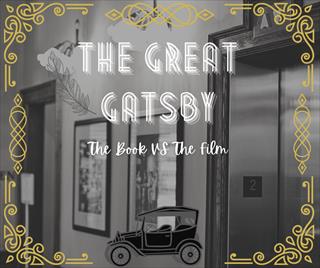The Great Gatsby- Book vs Film

Before we start I have to admit that I am a massive F. Scott Fitzgerald fan but for those of you who are not, here is a quick summary of ‘The Great Gatsby’ (without giving away any spoilers of course).
Nick Carraway is a young man who moved to New York in 1922 and came across his next-door neighbour, a mysterious and wealthy man named Jay Gatsby. At the end of the summer Nick is invited to the party of the year at Gatsby’s house. Here he meets a man named Jordan Baker through whom he learns that the parties are all constructed just to try and impress Daisy who happens to be Nick’s cousin. All Gatsby wants is for Nick to help him rekindle his love with Daisy, which he manages. From here everything begins to spiral downhill.
The biggest difference between the book and the film is that the very dramatic event that happens at the end is only hinted at in the book but is depicted in vivid detail in the film. The film is more effective in conveying the message but also much crueller. In depicting the events there can be no doubt about what happened or how it happened which in turn incriminates characters in ways that they are not in the book.
The other difference between the two is purely a result of the almost 100-year gap between their creations. In essence the book is a product of its time, it is quintessentially the roaring twenties with a few sparkly moments here and there. Having been written and set in the same time it is designed to feel modern. The film is a Baz Luhrmann spectacular. It shows an idealised twenties that has been modernised to twenty-first century standards by music and culture. It needs be said that edits to the story were inevitable to be able to effectively translate it to the screen but Luhrmann went a step further. The awards won for this production are endless, from Academy awards to BAFTA Awards and each was well-deserved. In this instance I do not feel like a choice between the film and the book is valid. They are simply different and cannot be compared.